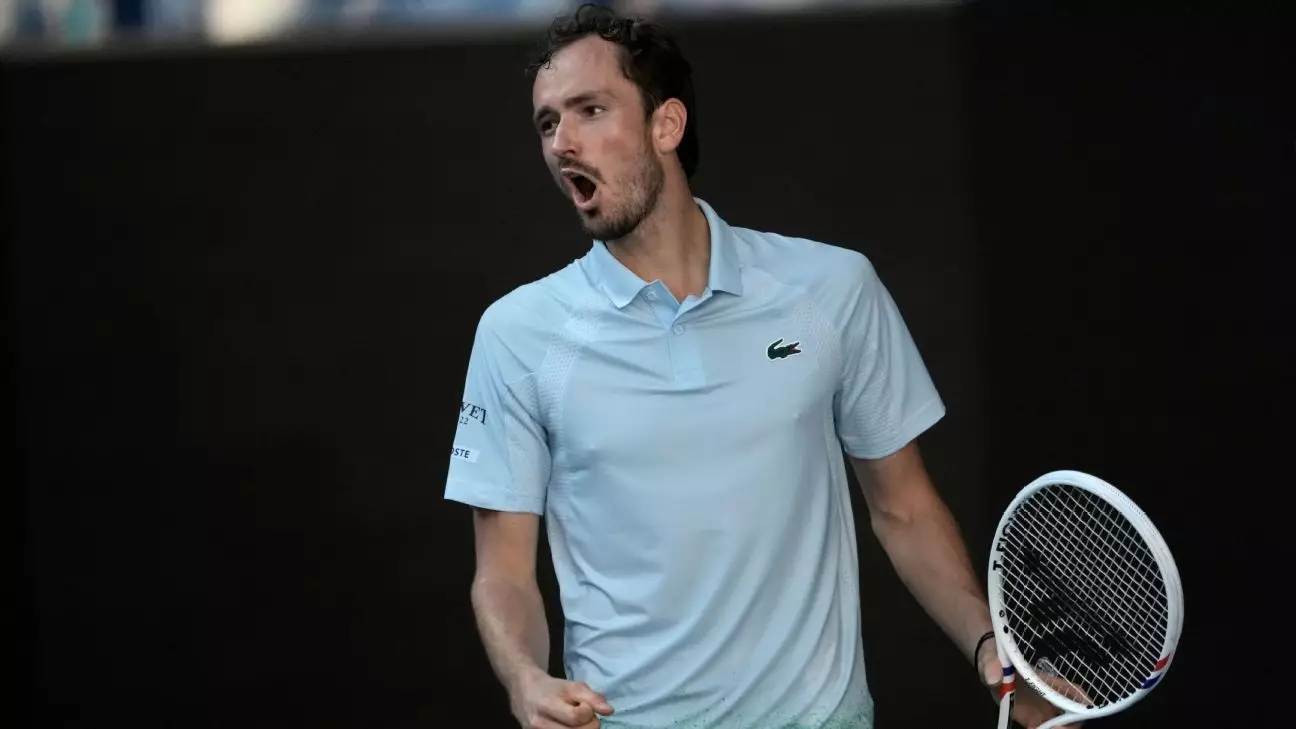In a dramatic first round at the Australian Open, Daniil Medvedev showcased both his formidable talent and a surprising emotional outburst as he battled against the underdog Kasidit Samrej, ranked 418th in the world. Medvedev, the fifth seed and a seasoned player with significant accomplishments—including a US Open title and multiple finals at Melbourne Park—faced unexpected adversity on the court. Ultimately, he emerged victorious, but not without moments of struggle that illuminated the inherent pressures of professional tennis.
The match unfolded on what was likely meant to be a straightforward outing for Medvedev. However, a mid-match slump nearly derailed his chances against Samrej, who was making an impressive Grand Slam debut. This scenario reflects a common conundrum in tennis: the unpredictable nature of the sport, where any player can rise to the occasion or falter under pressure. Medvedev’s struggles were palpable in the second and third sets, where he failed to find his rhythm and inadvertently invited doubts to creep in.
His frustration came to a head during a pivotal moment late in the third set. After dropping a key point—a long rally that ended with an uncharacteristic forehand error—Medvedev vented his ire by smashing his racket against a camera mounted on the net. This incident serves as a vivid metaphor for the internal turmoil many athletes experience when expectations collide with reality. The camera’s destruction, resulting in a code violation for racket abuse, encapsulated a fleeting moment of rage that contrasted sharply with his subsequent performance.
Following this display of frustration, Medvedev experienced a discernible shift in momentum. The fire ignited by his earlier struggles catalyzed a remarkable turnaround. The athlete swiftly claimed 12 of the last 15 games, overpowering Samrej with precision and a renewed focus. This abrupt change speaks volumes about the psychological aspect of sports; the capacity to channel one’s emotions, whether positive or negative, can often determine the outcome of a match.
Medvedev capped off the encounter with an impressive tally of 24 aces contrasted with only 34 unforced errors—less than half of Samrej’s 69. The young Thai player had set out to achieve a milestone by becoming the lowest-ranked player to defeat a top-five seed in Grand Slam history; such narratives add an undercurrent of drama to the competition. Samrej’s potential upset reminded fans that the allure of tennis lies not only in the stars but also in the unexpected brilliance of emerging talents.
In the wake of his victory, Medvedev reflected on his performance with a blend of humor and insight. He joked about needing more time on the court to find his rhythm perfectly capturing the essence of athlete preparation—often, practice matches can feel distinctly different from competitive play. This hint of self-deprecation, coupled with the awareness that he had previously struggled in similar scenarios, showcased Medvedev’s growth as a player. His admission that a year prior, his performance might not have secured a win highlights the evolution of his mental fortitude.
This year marks a fresh start for him, one imbued with optimism and vigor. As he progresses in the tournament, Medvedev’s resilience will be put to the test again, raising questions about how he will respond to future adversities. Will he continue to harness his emotional highs and lows constructively, or could we witness moments of frustration like those during his match with Samrej?
The opening match serves as both a cautionary tale and a celebratory testament to Medvedev’s journey in the ATP circuit. Tennis, like many sports, is characterized by its peaks and valleys; champions are often defined not merely by their victories but also by their ability to navigate through hardship. As Medvedev moves forward in the tournament, one can only anticipate the blend of excellence and vulnerability that defines his essence. Whether it leads him to another title or not, each match is another step in the enduring narrative of his career—a poignant reminder that even at the highest levels, the struggle remains an indelible part of the game.


Leave a Reply